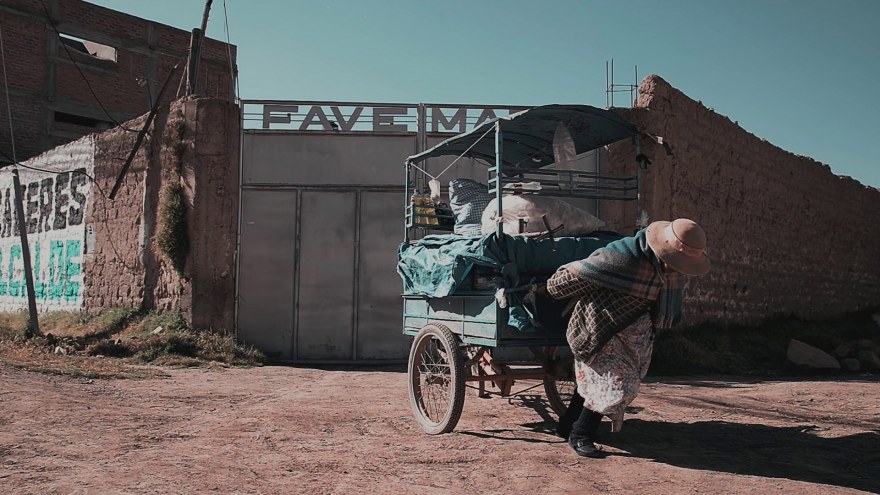Tea time with Mamapara
Interview with Alberto Flores Vilca, director of Mamapara
I notice you share a name with Honorata Vilca. Can you tell us more about your relation to her?
Mrs. Honorata Vilca is my mother. Since I was 4 years old, I grew up away from her, so I needed to get to know her better, to get closer, to shorten that distance. Although I have lived away from her, she has always instilled in me a fervent discipline and solid values, especially sincerity. That is why this documentary is an example of that learning, my greatest act of sincerity: to show my mother, without feeling ashamed.
Tell us more about the reference to her as Mamapara. What was the inspiration behind the poetic voice over?
Before I became a filmmaker, when I finished school, I joined a literature collective called Hervidero Rapsodial, where I started writing poetry and ended up editing a collection of poems called Dead Dust, which I never published. Already in university I embraced filmmaking. In my childhood I learned Quechua, a melancholic and poetic language. The documentary had a nostalgic tone, so the use of Quechua was ideal. When I wrote the text for the voice over, I remembered my facet as a poet, that was also nostalgic.
What are the rituals she conducts around Sergeant?
It is called K’intuchiy (choose, in Quechua) which consists of putting three whole coca leaves in each corner of the grave, it is a way of asking permission from Mother Earth (Pachamama) to proceed with the burial. Afterwards, the body is perfumed with incense to purify it so that it is well received by the earth.
Who is the rapper on the bus, what’s his story?
While I was recording my mother’s scene on the bus, a young man suddenly got on the bus and started singing. The rapper was improvising lyrics with objects of the passengers, which seemed interesting to me and I decided to record it, not knowing if the recording would use it or not. During the editing, I noticed that the rapper had improvised lyrics with my mother’s blanket, the lyrics were beautiful and I decided to include it in the final cut. The rapper’s singing was not planned, it was spontaneous and fast, I was so focused on recording my mother that I didn’t have time to ask his name before he got off the bus. Days after the shoot, I tried to look for him on the same bus and other places, but I had no luck.
Can you tell us more about the co-production process involving three countries?
In 2018, I was selected in Talents Buenos Aires (Argentina). Mamapara was still a project, I showed a preview in that event. That’s how Mario Manriquez became interested and an agreement was made to co-produce with Argentina. At the same event Claudio Servin offered me his help in sound post-production. When Mamapara was already in post-production, I contacted Miguel Patzzi from Bolivia, whom I had met in Chile in an event similar to the Talents, to do the color. Mamapara is the result of a collective work, which lasted more than a year and a half, between editing and shooting.
What sort of genres and themes would you like to work on next?
I have just been selected at the Berlinale Talents of the Berlin International Film Festival 2020, I applied with my new project, it will be my debut feature. The documentary is an exercise in memory that deals with a personal trauma that I experienced during my childhood. The story takes place during Alberto Fujimori’s dictatorship.
Are there any works of art or films that have inspired you?
Actually, many things inspire me, from a bicycle parked on a doorway, to a raindrop on the windshield, to simple things in life. The film that marked my love for documentary cinema was Cuates de Australia by Everardo Gonzales, it was incredible how it captured with total naturalness and spontaneity the life of the members of a rural community in Mexico. That way of approaching people, practically hiding the presence of the documentary filmmaker, marked me. In fact, I was also influenced by Bela Tarr’s The Horse of Turin and Abbas Kiarostami’s films.
Would you say that the short film format has given you any particular freedom?
Maybe it’s not the format, but the film genre. I find the particular freedom in documentary film more than in any other genre, in the technical aspects, the aesthetics and the narrative forms. What perhaps the short film offers me is the ability to condense a story, to say in a few minutes what is important, like haikus (Japanese poetry) say what is necessary and most important in a few verses.
Mamapara is part of International Competition I6.








